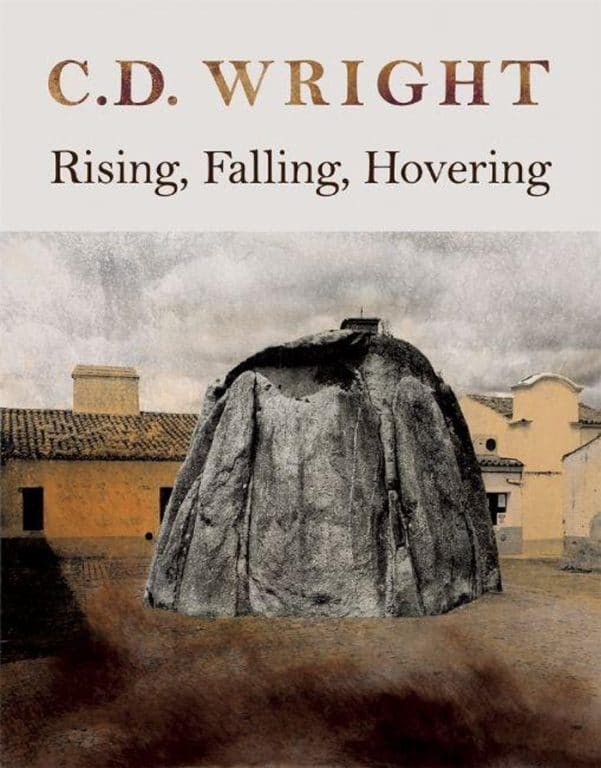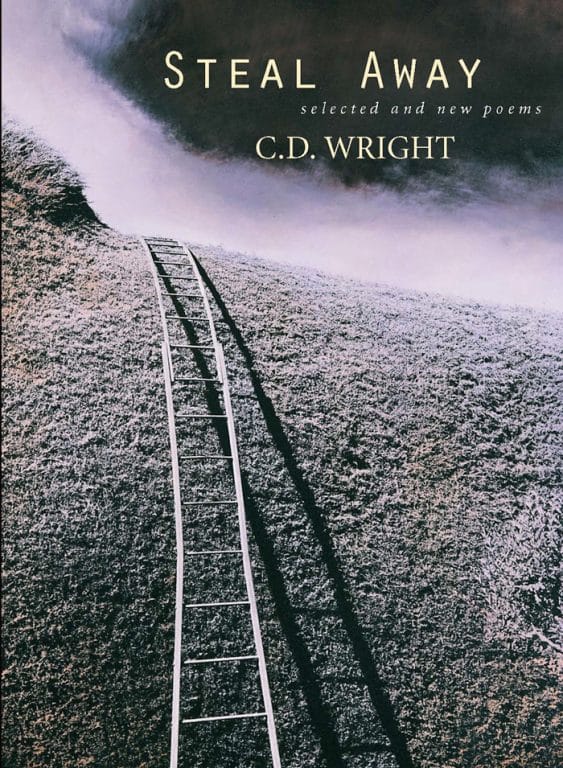
C. D. Wright was born and raised in the Ozark Mountains of Arkansas. She has published 12 previous poetry collections. Her collaboration with photographer Deborah Luster, a journey into the prison-industrial complex entitled One Big Self, was honoured with a Lange-Taylor Prize from the Center for Documentary Studies. Wright has also received fellowships from the MacArthur Foundation, the Guggenheim Foundation, the National Endowment for the Arts, and the Lannan Foundation. In the 1990s she served for five years as the State Poet of Rhode Island. Wright is currently the Israel J. Kapstein Professor of English at Brown University, and lives outside Providence, Rhode Island.
Photo Credit: © Miriam Berkley, All rights reserved


- 2009
- 2003
Judges’ Citation
C.D. Wright’s work is plain gorgeous; it is clean-wrought, rich, rambunctious, and pure-thrown, like a perfect game.
C.D. Wright’s work is plain gorgeous; it is clean-wrought, rich, rambunctious, and pure-thrown, like a perfect game. This is the generous art of a graceful outlaw troubadour, singing to us as if from within ourselves. The poems seem written not with ink or pencil-lead but with life-stuff itself as their matter, alphabet, and orthography. They are dense with a sense of substance and absence, love and grief and humor and horror. And how unusual it is, this mix of classes, races, sensualities, economies and vocabularies – as if a people were writing its (our) true poetry. Here is a radical home voice, an original vision, luminously peculiar/precise; here is a new American music, with a green, wisdom-struck clarity and mercy.
Judges’ Citation
C. D. Wright’s thirteenth collection, Rising, Falling, Hovering, reminds us what poetry is for.
C. D. Wright’s thirteenth collection, Rising, Falling, Hovering, reminds us what poetry is for. This is poetry as white phosphorus, written with merciless love and depthless anger, but it is ‘not a chemical weapon, it’s an incendiary … it is for illumination’. Rising, Falling, Hovering is about conflict, local and global, and how failures of the heart bring disaster on every scale. In the long poem that anchors this book, Wright ties together the war in Iraq, the war on the poor, the challenges borders present, and family crises to create a portrait of the human soul riven by separateness. It is, primarily, a red-hot political epic, in which Wright states ‘to be ashamed is to be American’ and that ‘happiness is for amateurs’. And yet, how can we react to a poetry this alive with invention and purpose but with joy? In Rising, Falling, Hovering, C. D. Wright wakes the reader – from dreams of both a perfect world and one drowned in horror – to the saving beauty of clear sight. Over a long career marked by deep moral engagement and constant reinvention, Wright has placed herself and her readers ‘at a crossroads’, as she writes, which is not just a place, but ‘the very instant you stopped looking for meaning and began rifling among the folds of feeling instead where things were to be made new again …
Selected poems
by C. D. Wright
has been written in mud and butter
and barbecue sauce. The walls and
the floors used to be gorgeous.
The socks off-white and a near match.
The quince with fire blight
but we get two pints of jelly
in the end. Long walks strengthen
the back. You with a fever blister
and myself with a sty. Eyes
have we and we are forever prey
to each other’s teeth. The torrents
go over us. Thunder has not harmed
anyone we know. The river coursing
through us is dirty and deep. The left
hand protects the rhythm. Watch
your head. No fires should be
unattended. Especially when wind. Each
receives a free swiss army knife.
The first few tongues are clearly
preparatory. The impression
made by yours I carry to my grave. It is
just so sad so creepy so beautiful.
Bless it. We have so little time
to learn, so much… The river
courses dirty and deep. Cover the lettuce.
Call it a night. O soul. Flow on. Instead.
Copyright © C.D. Wright, 2002
Everything Good between Men and Women
In front of a donut shop someone’s son is shot dead
A witness on condition of anonymity
The slow open vulgar mouth drawing on a cigarette
In a face once called Forever Young
Now to be known as Never-a-Man
Gone to the world of the working and the prevaricating
of the warring world of drywalling of lousy test scores
of fishing from a bridge on a brilliant afternoon
belt buckle blown undone
Recollect reading to her boy
reading to him in bed overcome herself
with sleep as if drugged or slugged then jabbed up again
Come on Keep reading Don’t stop Don’t ever stop
like she was saying Beauty cannot she cannot marry
the Beast and tonight as on all other rose-scented evens
He stumbles the Beast he stumbles from Beauty’s empty chamber
In agony he goes in agony the fur of his fingers
smoking until it’s her boy he is the one saying
exclaiming Yes Yes he will he will marry the Beast
until he is the one who conks out
as a light pole struck by a drunken car
And suddenly it’s raining like plastic
When she stumbles at last from the room
he is the one who shakes himself awake
and yells Protect me and she is the one
who promises exclaiming Yes Yes she will I swear
if it kills me I will as once the mother
of Forever Young shot in front of the donut shop
must have sworn if it killed her she will a boy
So quiet the report heard from his kin
You wouldn’t even notice him on your electric bill
Over there it’s a different world
Desperate to be rejoined to this one
Copyright © 2008 by C.D. Wright
from Rising, Falling, Hovering
Once he comes to live on the outside of her, he will not sleep
through the night or the next 400. He sleeps not, they sleep not.
Ergo they steer gradually mad. The dog’s head shifts another
paw under the desk. Over a period of 400 nights.
You will see, she warns him. Life is full of television sets,
invoices, organs of other animals thawing on counters.
In her first dream of him, she leaves him sleeping on Mamo’s
salt-bag quilt behind her alma mater. Leaves him to the Golden
Goblins. Sleep, pretty one, sleep.
… the quilt that comforted her brother’s youthful bed, the
quilt he took to band camp.
Huh oh, he says, Huh oh. His word for many months.
Merrily pouring a bottle of Pledge over the dog’s dull coat. And
with a round little belly that shakes like jelly.
Waiting out a shower in the Border Cafe; the bartender
spoons a frozen strawberry into his palm-leaf basket while they
lift their frosted mugs in a grateful click.
He sits up tall in his grandfather’s lap, waving and waving to
the Blue Bonnet truck. Bye, blue, bye.
In the next dream he stands on his toes, executes a flawless
flip onto the braided rug. Resprings to crib.
The salt-bag quilt goes everywhere, the one the bitch
Rosemary bore her litters on. The one they wrap around the
mower, and bundle with black oak leaves.
How the bowl of Quick Quaker Oats fits his head.
He will have her milk at 1:42, 3:26, 4 a.m. Again at 6. Bent
over the rail to settle his battling limbs down for an afternoon
nap. Eyes shut, trying to picture what in the world she has on.
His nightlight – a snow-white pair of porcelain owls.
They remember him toothless, with one tooth, two tooths,
five or seven scattered around in his head. They can see the day
when he throws open his jaw to display several vicious rows.
Naked in a splash of sun, he pees into a paper plate the guest
set down in the grass as she reached for potato chips.
Copyright © C.D. Wright, 2002
from What No One Could Have Told Them
One was always going when the other was coming back
One was biting a green apple
The deeper the evening the louder the singing
Throwing the core out the window
An oar stirred the dark then quit
A face drenches itself in carlight
A wrist wearing a man’s watch dipped a net
Even as one turned toward an unfinished building
The other wondered what one would have on
Upon returning will the hair be fallen or cropped
If one reaches what is grasped for
Gnats go for the eyes
Will utter disappointment set in
Will it be water or milk or wine tonight
Mostly one listened in the low-intensity glow
Of events one sustains incomprehensible feelings
Copyright © C.D. Wright, 2002
Ponds, In Love
It is 2005, just before landfall.
Here I am, a labyrinth, and I am a mess.
I am located at the corner of Waterway
and Bluff. I need your help. You will find me
to the left of the graveyard, where the trees
grow especially talkative at night,
where fog and alcohol rub off the edge.
We burn to make one another sing;
to stay the lake that it not boil, earth
not rock. We are running on Aztec time,
fifth and final cycle. Eyes switch on/off.
We would be mercurochrome to one another
bee balm or chamomile. We should be concrete,
glass, and spandex. We should be digital or,
at least, early. Be ivory-billed. Invisible
except to the most prepared observer.
We will be stardust. Ancient tailings
of nothing. Elapsed breath. No,
we must first be ice. Be nails. Be teeth.
Be lightning.
Copyright © 2008, C.D. Wright, Rising, Falling, Hovering, Copper Canyon Press
Re: Happiness, in pursuit thereof
More years pass and the book does not leave the drawer.
According to our author the book does not begin but opens on
a typewriter near a radiator. The typing machine has been
aimed at the window overlooking a park. It’s been oiled and
blown out. At heart it is domestic as an old washer with them
white sheets coming off the platen. In the missing teeth much
has been suppressed. In the space and a half, regrettable things
have been said. Nothing can be taken back. The author wanted
this book to be friendly, to say, Come up on the porch with
me, I’ve got peaches; I don’t mind if you smoke. It would be written
in the author’s own voice. A dedication was planned to
Tyrone and Tina whose names the author read in a sidewalk on
Broad. The machine’s vocation was to type, but its avocation
was to tell everyone up before light, I love you, I always will; to
tell the sisters waiting on their amniocenteses, Everything’s
going to be fine. And to make something happen for the
hundreds of Floridians betting the quinella. It would have
dinner ready for people on their feet twelve house a day. And
something else for the ones making bread hand over fist, the
gouging s-o-bs. But the book was too dependent. Women were
scattered across pages who loved the desert, but moved into
town to meet a man. The women, understand, weren’t getting
any younger. Some of these women were pecking notes into the
text when the author was out walking. One note said: John Lee
you’re still in my dreambooks, et cetera. The author had no
foresight. In previous drafts the good died right off like notes
on an acoustic guitar. Others died of money, that is, fell of
odorless, invisible, utterly quiet wounds. The work recorded
whatever it heard: dog gnawing its rump, the stove’s clock, man
next door taking out his cans, and things that went on farther
down, below buildings and composts, all with the patience of a
dumb beast chewing grass, with the inconsolable eyes of the
herd. Basically the book was intended as a hair-raising
document of the organisms. Thus and so the book opens: I have
been meaning to write you for a long long time. I’ve been
feeling so blue John Lee.
Copyright © C.D. Wright, 2002